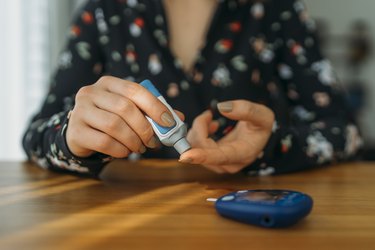
In order to understand what high insulin means, it's helpful to know how insulin works in the body.
When you eat, your body converts the carbohydrates in your food into glucose, also known as blood sugar. Insulin, a hormone produced by the pancreas, helps regulate that blood sugar, according to Kaiser Permanente. It moves the glucose out of the bloodstream into the cells, where it is used as energy. If there is too much glucose in the blood — a condition known as hyperglycemia, or high blood sugar — insulin works to bring blood sugar levels back to normal.
Video of the Day
Video of the Day
If blood sugar levels are frequently high, however, the body must release extra insulin. This can result in chronically high insulin levels, a condition known as hyperinsulinemia. According to the Mayo Clinic, hyperinsulinemia doesn't usually cause noticeable symptoms. But chronic hyperglycemia — the underlying issue that high insulin levels are trying to correct — can eventually lead to type 2 diabetes.
Hyperinsulinemia and Insulin Resistance
High insulin is more an indicator of an underlying condition than a condition on its own. "I would associate high insulin with insulin resistance," says Heidi Karner, RDN, LDN, a registered dietitian nutritionist at the Joslin Diabetes Center. She also points out that hyperinsulinemia isn't diabetes in and of itself. "A person could have insulin resistance or prediabetes without necessarily having a diabetes diagnosis," she says.
Insulin resistance happens when the body becomes insensitive to the insulin it produces, meaning that it can't effectively use the insulin to lower blood sugar levels, according to the National Institutes of Health. When this happens, the pancreas makes more insulin in an effort to meet the body's greater demand. But if high blood sugar levels persist, the pancreas may not be able to keep up — and without enough insulin, the body can't reduce blood glucose properly. This inability to manage blood sugar is the core issue for people with prediabetes and type 2 diabetes.
Symptoms of High Insulin and High Blood Sugar
High insulin and high blood sugar often go hand-in-hand. While high insulin doesn't produce symptoms on its own, the Cleveland Clinic notes that symptoms of high blood sugar include:
- Frequent urination
- Increased thirst
- Blurred vision
- Fatigue
- Increased hunger
Get Tested for Diabetes
If you're experiencing symptoms of high blood sugar, speak with your doctor right away. He or she will likely want to test you for prediabetes or diabetes.
Diabetes is usually diagnosed with a blood test. It is also common to take an oral glucose tolerance test, according to the Mayo Clinic. This test is typically performed first thing in morning, because you'll have to fast for at least eight hour in advance. The test includes consuming a very sugary drink and then having your blood glucose checked at regular intervals to see how your body is responding to the carbohydrates.
Here are the possible results: A normal fasting blood sugar level is less than 95 milligrams per deciliter (mg/dL). Two hours after drinking the glucose solution, a normal blood sugar level is less than 140 mg/dL. If your results show a blood sugar level between 140 and 199 mg/dL, you will be considered to have prediabetes. If, after two hours, your blood sugar is 200 mg/dL or higher, it indicates diabetes.
If you are diagnosed with prediabetes or diabetes, you will need to make lifestyle changes. This often includes dietary changes, increased exercise and possibly medications. If diabetes goes untreated, it can, over time, severely damage other parts of the body, including the eyes, liver and kidneys, per the National Institutes of Health.
Other Causes of High Insulin
The most common cause of high insulin is high blood sugar. But in rare cases, hyperinsulinemia can be caused by conditions that affect the pancreas. One of these conditions is a rare type of pancreatic tumor called an insulinoma, according to Johns Hopkins Medical Center.
Hyperinsulinemia can also be caused by a condition called nesidioblastosis, in which the pancreas makes too many insulin-producing cells, according to the U.S. National Library of Medicine.
In both of these cases, hyperinsulinemia can cause symptoms of low blood sugar, aka hypoglycemia. Hypoglycemia symptoms can include hunger, irritability, confusion, blurred vision and feeling weak, faint, shaky or fatigued, according to the Mayo Clinic. Be sure to consult with your doctor if you are experiencing these symptoms.
- Kaiser Permanente: "How the Body Controls Blood Sugar"
- Mayo Clinic: "Hyperinsulinemia: Is It Diabetes?"
- National Institutes of Health: "Insulin Resistance & Prediabetes"
- Cleveland Clinic: "Hyperglycemia (High Blood Sugar)"
- Mayo Clinic: "Glucose Tolerance Test"
- Johns Hopkins Medical Center: "Insulinoma"
- U.S. National Library of Medicine: "Nesidioblastosis in Adults"
- Mayo Clinic: "Hypoglycemia"
Is this an emergency? If you are experiencing serious medical symptoms, please see the National Library of Medicine’s list of signs you need emergency medical attention or call 911.